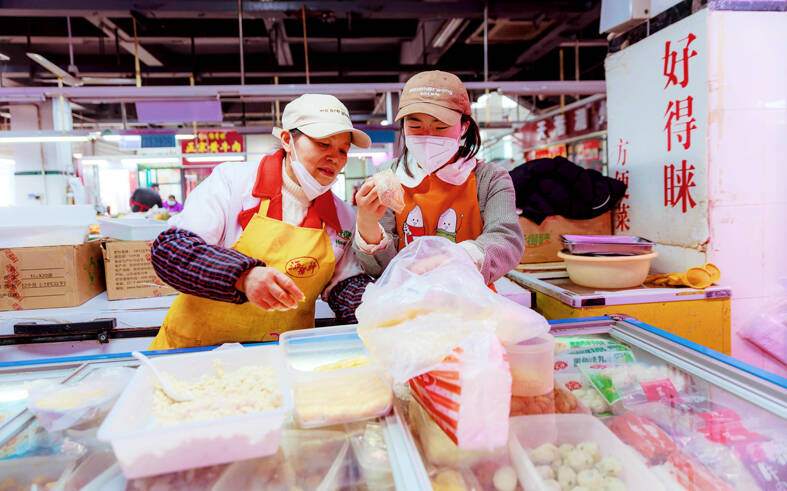China is not participating in a UN project to survey Asian wet markets and other facilities at high risk of spreading infectious diseases from wild animals to humans, despite long-running talks with Beijing, a UN official said.
China’s hesitancy to join the UN project involving other Asian nations might compound frustration by global researchers, who have been pressing Beijing to share information about the origins of COVID-19, as they seek to prevent future pandemics due to animal-to-human disease transmission.
Four Asian countries — China, Thailand, Vietnam and Laos — were initially selected for the survey by the scientific advisory committee of the project, called the Safety across Asia For the global Environment (SAFE), because they host multiple facilities presenting risks of animal-to-human disease transmission, the UN official said.

Photo: EPA-EFE
The selection for the project, launched in July 2021, was also made after major wildlife trafficking cases were detected, investigated and prosecuted in those countries, which increased zoonotic risks, the official said.
“China was initially in discussions to be part of the project,” the official said, declining to be named as the information was deemed sensitive.
The official said discussions with China are still ongoing, but did not clarify with which state institution the UN project is holding talks.
The Chinese Ministry of Foreign Affairs and the Chinese National Forestry and Grasslands Administration, which oversees the management of wildlife and was involved in initial talks with the project organizers, did not respond to requests for comment.
The official said the forestry agency initially showed interest in the project, but eventually declined to join, saying it was not under its remit.
The agency did not indicate which government agencies would be responsible for the matter, the official said.
The UN Office on Drugs and Crime, which monitors illegal wildlife trafficking and coordinates the SAFE project, did not immediately comment.
After COVID-19 first emerged in the Chinese city of Wuhan in December 2019, many researchers suspected it spread in a live animal market there.
China has since banned the sale and consumption for food of wild animals.
Despite the ban, experts warn that risks still remain.
“There are glaring holes in the restrictions that still pose a zoonotic disease risk,” said Peter Li, a China policy specialist at Humane Society International, a US-based nonprofit organization.
He said China still allows wildlife breeding on a massive scale for the fur trade, traditional medicine, pet trade and entertainment or display in low-welfare conditions.
China’s public security agencies handled more than 70,000 criminal cases involving wild animals from 2020 to last year, confiscating 1.37 million wild animals in the process, Xinhua news agency reported.

Right-wing political scientist Laura Fernandez on Sunday won Costa Rica’s presidential election by a landslide, after promising to crack down on rising violence linked to the cocaine trade. Fernandez’s nearest rival, economist Alvaro Ramos, conceded defeat as results showed the ruling party far exceeding the threshold of 40 percent needed to avoid a runoff. With 94 percent of polling stations counted, the political heir of outgoing Costa Rican President Rodrigo Chaves had captured 48.3 percent of the vote compared with Ramos’ 33.4 percent, the Supreme Electoral Tribunal said. As soon as the first results were announced, members of Fernandez’s Sovereign People’s Party

EMERGING FIELDS: The Chinese president said that the two countries would explore cooperation in green technology, the digital economy and artificial intelligence Chinese President Xi Jinping (習近平) yesterday called for an “equal and orderly multipolar world” in the face of “unilateral bullying,” in an apparent jab at the US. Xi was speaking during talks in Beijing with Uruguayan President Yamandu Orsi, the first South American leader to visit China since US special forces captured then-Venezuelan president Nicolas Maduro last month — an operation that Beijing condemned as a violation of sovereignty. Orsi follows a slew of leaders to have visited China seeking to boost ties with the world’s second-largest economy to hedge against US President Donald Trump’s increasingly unpredictable administration. “The international situation is fraught

Taiwan Semiconductor Manufacturing Co (TSMC, 台積電) plans to make advanced 3-nanometer chips in Japan, stepping up its semiconductor manufacturing roadmap in the country in a triumph for Japanese Prime Minister Sanae Takaichi’s technology ambitions. TSMC is to adopt cutting-edge technology for its second wafer fab in Kumamoto, company chairman C.C. Wei (魏哲家) said yesterday. That is an upgrade from an original blueprint to produce 7-nanometer chips by late next year, people familiar with the matter said. TSMC began mass production at its first plant in Japan’s Kumamoto in late 2024. Its second fab, which is still under construction, was originally focused on

GROWING AMBITIONS: The scale and tempo of the operations show that the Strait has become the core theater for China to expand its security interests, the report said Chinese military aircraft incursions around Taiwan have surged nearly 15-fold over the past five years, according to a report released yesterday by the Democratic Progressive Party’s (DPP) Department of China Affairs. Sorties in the Taiwan Strait were previously irregular, totaling 380 in 2020, but have since evolved into routine operations, the report showed. “This demonstrates that the Taiwan Strait has become both the starting point and testing ground for Beijing’s expansionist ambitions,” it said. Driven by military expansionism, China is systematically pursuing actions aimed at altering the regional “status quo,” the department said, adding that Taiwan represents the most critical link in China’s